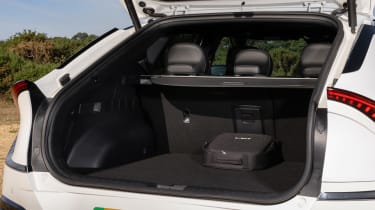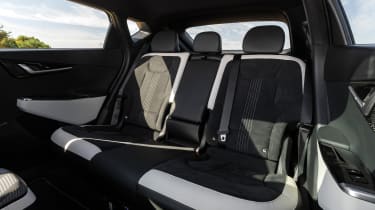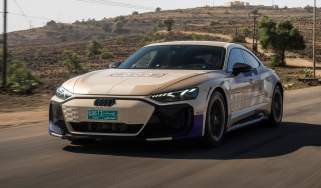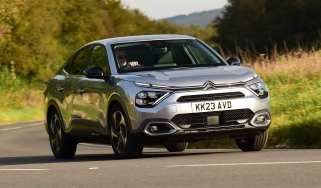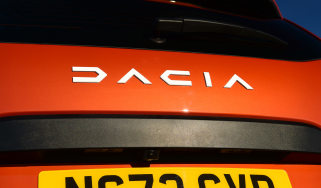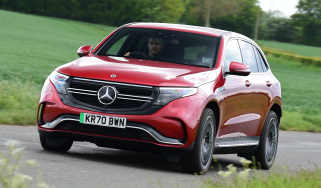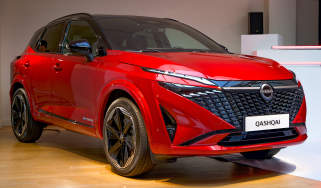Kia EV6 - Practicality, comfort and boot space
The Kia EV6 is full of useful practical touches, but rivals offer more interior space

The Kia EV6 shares the same E-GMP architecture as the Hyundai Ioniq 5, but it offers a sportier edge to its design and driving setup. At low speeds in urban areas, imperfections in the road are transmitted through the stiff chassis, but it’s far from uncomfortable. At motorway speeds, the EV6 settles down and becomes a rather serene cruiser. Despite its firmer ride, it remains a pleasantly composed family car, with little whine from the electric motor.
There are practical touches that help to make family life a little easier; there are plenty of useful cubbies, including a deep recess underneath the floating centre console; the rear seats fold in a 60:40 configuration and include a ski hatch for loading longer items, while USB-C charging ports are built into the sides of both front seats, so there should be no squabbling between those in the rear about who gets to charge their devices.
Other kit, such as auto headlights and wipers, is standard, while GT-Line cars include Kia’s Premium Relaxation Seats, which can recline when the vehicle is charging to provide the driver with a more comfortable position to take a nap if they feel tired.
The Vehicle to Load function (V2L) is a neat idea that allows the EV6 to power or charge devices — via a three-pin plug. We think that’s an especially neat idea if you are on a camping trip away from mains electricity because it allows you to keep your phone topped up, or even power items, such as a laptop. A V2L dock is located under the rear seat, while an adaptor can also be used to connect to the main external charging port.
Size
As with the Hyundai Ioniq 5, the EV6 is a surprisingly big car in the metal. At 4,680mm long, 1,550mm tall and 1,880mm wide, the EV6 is 31mm longer than a Skoda Enyaq, although the width is virtually identical. It’s also 66mm lower than the Enyaq, which helps give the Kia its sporty, dynamic look. The 2,900mm wheelbase is actually longer than the Audi A8, meaning there’s plenty of room inside.
Leg room, head room & passenger space
There’s no shortage of space up front in the EV6, so the driver and front passenger should have no issue getting comfortable. While the Ioniq 5 chooses to emphasise the amount of space it offers, the EV6 separates the driver and front passenger with a centre console, but it’s not so wide that you’ll be clanging your knee into it all the time or tall enough to make you feel entombed within the cabin. You won’t sit as low as you do in some electric saloons, like a Tesla Model 3, for instance, but the driving position feels quite low slung, and gives the EV6 a sportier feel than the Ioniq 5’s.
More reviews
Swing open the rear doors and you can marvel at the acres of legroom on offer, thanks partly to the EV6’s enormous wheelbase. The completely flat floor also helps in this department, and if you need to carry three adults across the back, they wouldn’t be forced to play footsie for the entire journey. The EV6’s sleek, sporty profile and lower roofline affect headroom only slightly. Taller passengers might find it a little tight in the back, but anyone under six feet shouldn’t have anything to complain about.
Boot
At 490 litres, the EV6’s boot is a useful size, while a variable-height boot floor means you can decide whether to maximise space or create a flat loading lip. The 60:40 split rear seats fold down nearly flat, and doing so expands the luggage capacity all the way up to 1,300 litres. Rear-drive cars also benefit from a 52-litre storage compartment under the bonnet, while this space is reduced to 20 litres in all-wheel drive versions. Either way, the EV6’s ‘frunk’ is good for keeping your charging cables out of sight.
Towing
The maximum braked trailer towing weight for the EV6 is 1,600kg, which should be more than adequate to pull a decent-sized trailer or a small- to medium-sized caravan. However, we'd always advise double-checking your trailer’s weight before hitting the road.
